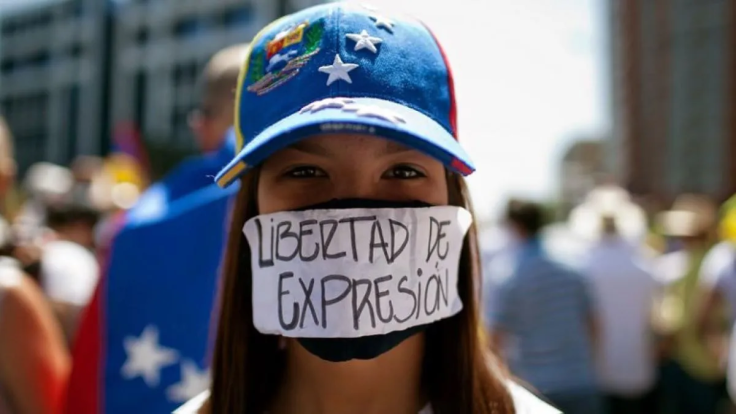
After Nicolas Maduro was declared winner of the presidential elections after a controversial decision by the country's electoral council, Venezuelans are bracing themselves for major consequences. One of the biggest issues on the horizon might come as a result of citizens leaving the country, deepening the ongoing crisis that has pushed more than 7.7 million Venezuelans to leave their homes over the past decade.
But another issue that might get much worse with another term of Maduro in power might be access to information.
As currently stands, Venezuela sits on top of a complicated mix of factors that severely threaten any possibility of getting informed in a timely fashion, resulting in a context that is fertile for the surge of fake news, self-censorship and overall disinformation.
Attacks on press workers
During last Sunday's election, for example, NGO Espacio Público, which promotes freedom of speech in the country, reported 30 cases against freedom of speech across the country, comprised of 26 intimidations, two for censorship, one aggression and one attack.
A journalist from Tal Cual, outlet that was blocked last week inside the country, declared that he was refused access to statements in a voting center in La Guaira: "they took piectures of me and my documents. They held me there for a while without any official reason."
Abuses, according to Espacio Público, occurred mostly despite the fact that journalists had official credentials from CNE, the electoral council.
Although the number hasn't been updated for 2024, the organization tallied a whopping 1317 cases of journalists being attacked, detained or murdered since 2002, adding that almost the totality of them remain without legal resolution.
Media outlets blocked
The newest report by Espacio Público came one week after at least five independent outlets were blocked within the country: El Estímulo, Analítica, Runrunes, Medianálisis and TalCual. According to local NGO VE Sin Filtro, the newest wave took the the overall number of sites blocked since the electoral campaign began to 11, including Cazadores de Fake News, Es Paja and el Observatorio Venezonalo de Fake News, all outlets dedicated to combating misinformation.
In an interview with The Latin Times, the president of Venezuela's National Journalist's Association, Tinedo Guía, took aim at the regime's actions:
The message is very clear: it is a message of fear, intimidation, to temporarily freeze the information that these outlets provide. They wish to dismantle the sources of news that still spark communities in this country. Traditional media has been shut down because of all the pressure they receive by Conatel (an agency of the government of Venezuela that exercises the regulation, supervision and control over telecommunications). Conatel has become a sanctioning body rather than a technical one and big outlets have been censoring themselves because they could risk losing their broadcast licenses.
Making matters worse, most of these cases don't even get to see their day in court, resulting in a media landscape in which self-censorship has become common practice. "There's a clear intention to generate informational obscurantism in which those who are not aligned with the current government cannot speak the truths," explained Guía.
The decay of Venezuela's internet infrastructure
Besides censorship and intimidation, there's another factor that affects not only Venezuelan's access to information but their overall daily lives: a collapsing internet structure.
"While the rest of Latin America has seen substantial growth in network infrastructure, such as an increasing number of submarine cables and peering facilities, Venezuela has been left behind," explains a recent study by Northwestern Engineering's Fabian E. Bustamante and Esteban Carisimo,.
Bustamante and Carisimo, who direct a research group that investigates large-scale networks and distributed systems, found that while the region has added numerous submarine cables, Venezuela has established only one new connection with Cuba, its close ally. That has left its state-owned Internet provider, CANTV, without U.S.-based transit routes, creating an overreliance on domestic markets.
"The consequences of these discrepancies are stark. For instance, while global download speeds have improved significantly, Venezuela's average download speed has stagnated below 1 Mbps for over a decade, lagging far behind the rest of Latin America, where median speeds are around 20 Mbps."
Another finding by the pair has to do with DNS infrastructure. Efficient DNS servers, should be in proximity to users to minimize response time and ensure resilience. But Venezuela relies on servers located in the United States, Great Britain, Germany, France, and the Netherlands:
"As networks constantly evolve to support increasing traffic and the demand for a better quality of experience, Venezuela's crisis likely impedes capital investments to match the pace of growth seen in its Latin American peers."
© 2024 Latin Times. All rights reserved. Do not reproduce without permission.







